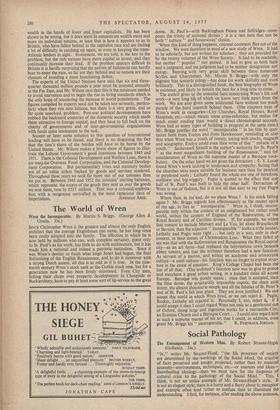Poverty and Principles
The War on World Poverty. By the Rt. Hon. Harold Wilson, M.P. (Gollancz. 14s.) PRESIDENT Roosevelt was sure that he did not like colonialism. We know now that one of the mainsprings of his actions at Teheran and at Yalta was distrust of British imperialism, a distrust that led him to venture rashly and too far into the arms of the Russians. When he died in 1945 the Dutch colonial empire was doomed, and the British and French empires were due for severe losses. The western world has been trying to fill the gap ever since, and, as Mr. Harold Wilson shows, is becoming increasingly alarmed at its serious extent. Indonesia, once regarded as a model colony, is now classified as the poorest of the twelve poorest countries of the world, its inhabitants having an average income estimated at $25 a head a year. Burma, which was before the war the granary of the Far East (if rice is grain), has only recently struggled back to self-sufficiency, and offers little prospect of return to its former indispensable role.
It is well to recall this immediate background to the problem, because Mr. Harold Wilson does not allow himself to do so. For him the years before 1945 have a strong political colouration of capitalist greed and exploitation. The ever-present tension between advanced and backward nations becomes something that was dis- covered for the first time by Britain's third Labour Government, and four centuries of European contact with the East have to be written off as an exercise in what ought not to have been done. In fact a tolerable, although only temporarily tolerable, working relationship was established under the colonial system, and it is presumptuous to condemn it before some other system at least equally satisfactory has been found for the problems raised by its, rapid removal.
Roosevelt seems to have assumed that once the imperial fetters were removed the colonies would with little difficulty become independent nations of the Western kind. But this is a difficult, competitive and nerve-racking kind of existence, from which large sections of the East have recoiled in horror. Hence, perhaps, their predilection for Communism, a creed that was never calculated to appeal to primitive peoples, but which at the moment offers the only escape to authoritarianism tolerated by any section of western thought.
Part of the motive power behind "The War on World Poverty " is fear of Communism. This is particularly strong in the case of the United States, which has to provide most of the funds. Rightly Mr. Wilson seeks to put the crusade on a more positive basis, and he stresses the old Malthusian fears of world food shortage, and the new ones of raw material shortage. At present these incentives to well-doing are not as strong as they appeared three years ago. Commodity prices have fallen dangerously low, and staple foodstuffs are accumulating in American barns at a rate faster than they can be either sold or given away. Really the crusade does not need these adventitious appeals to self-interest. There can surely be no one who is not prepared to accept as axiomatic the conclusion that " a peaceful world cannot be left half prosperous and half destitute."
The real problem is how to set about making the poor less poor. Karl Marx believed that the capitalist system would concentrate wealth in the hands of fewer and fewer capitalists. He has been shown to be wrong, but it does seem to concentrate wealth more and more on individual nations, at least that is how it appears to us in Britain, who have fallen behind in the capitalist race and are finding a lot of difficulty in catching up again, or even in keeping the trans- Atlantic leaders in sight. Investment, we are told, is the key to the problem, but the rich nations have more capital to invest, and they continually increase their lead. If the problem appears difficult in Britain it is hardly surprising that the natives of Indonesia can hardly bear to enter the race, so far are they behind and so remote are their chances of avoiding a most humiliating defeat.
The experts of the United Nations have said that six and three- quarter thousand million pounds a year must be invested annually in the Far East, and Mr. Wilson says that this is the minimum needed to avoid starvation and to begin the rise in living standards which is the only hope of countering the increase in world populations. The figures compiled by experts need not be taken too seriously, particu- larly when they run into billions, but there is a very grave, and so far quite unsolved, problem. Post-war political developments have robbed the backward countries of the domestic security which made them attractive to foreign capital, and they have to fall back on the charity of governments and of inter-governmental organisations with funds quite inadequate to the task.
Sooner or later some solution to this question of international lending will have to be found, and there is no disguising the fact that the lion's share of the burden will have to be borne by the United States. Mr. Wilson makes a brave show of figures to illus- trate the Labour Government's good intentions between 1945 and 1951. There is the Colonial Development and Welfare Loan, there is (or was).the Overseas Food Corporation, and the Colonial Develop- ment Corporation. But parliamentary votes and statutory bodies are of no value unless backed by goods and services rendered. Throughout these years we took far more out of our colonies than , we put in. Between 1945 and 1952 the colonies' sterling balances, which represent the excess of the goods they sent us over the goods we sent them, rose by £517 million. That was a colonial; exploita- tion with a vengeance unrivalled in the most rapacious days of



































 Previous page
Previous page